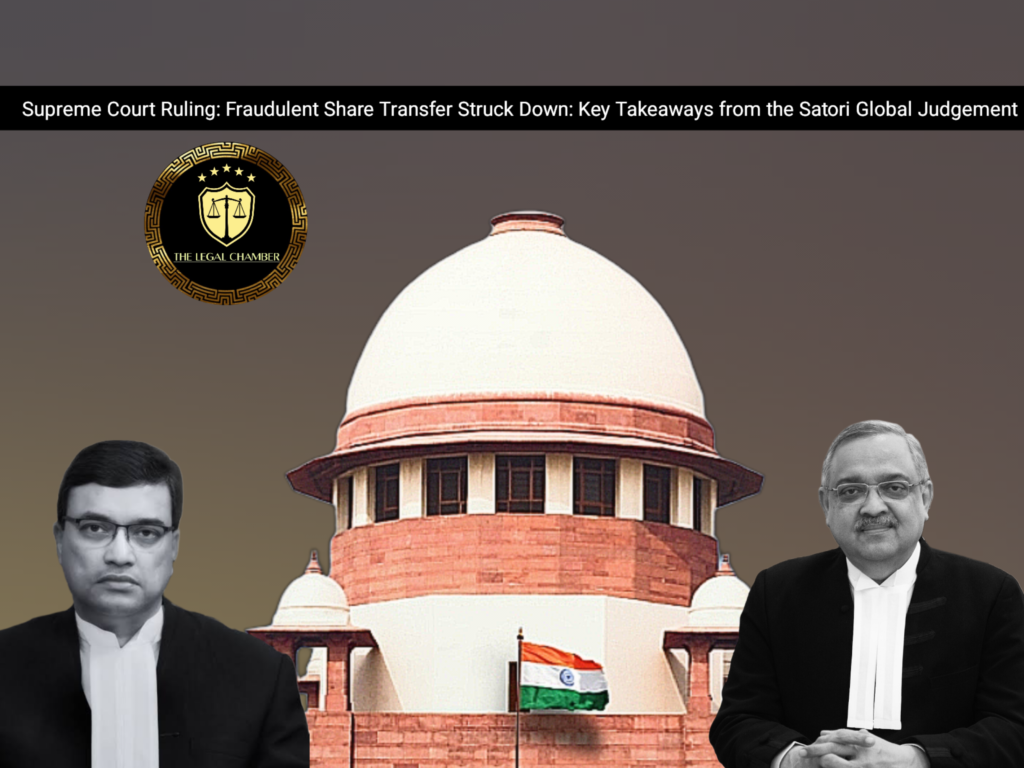
The Supreme Court ruled that the NCLT has wide jurisdiction under Sections 397 and 398 of the Companies Act, 1956, to adjudicate on allegations of fraud, oppression, and mismanagement when integral to the complaint. It upheld that acts violating the Articles of Association and statutory provisions, including invalid share transfers and board meetings, constitute oppression, empowering the Tribunal to grant comprehensive relief.
Facts Of The Case:
The case involves Mrs. Shailja Krishna, a majority shareholder holding over 98% of a private company, and her husband, Mr. Ved Krishna. In December 2010, during a strained marital relationship, Mrs. Krishna allegedly resigned from her directorship and executed a gift deed transferring her entire shareholding to her mother-in-law. She contended she was coerced into signing blank papers and was not present in the city where the deed was executed. Subsequently, board meetings held in her absence inducted new directors and accepted her resignation without proper notice or quorum. Her shares were later transferred using forms that had expired and showed evidence of tampering. After discovering her removal from the company’s records, she filed a petition before the Company Law Board (succeeded by the NCLT) alleging oppression and mismanagement. The NCLT ruled in her favour, but the NCLAT reversed the decision, holding that the NCLT lacked jurisdiction to decide on fraud. The Supreme Court ultimately set aside the NCLAT’s judgment, restoring the NCLT’s order.
Procedural History:
The case originated with a company petition filed by Mrs. Shailja Krishna before the Company Law Board (CLB) under Sections 397 and 398 of the Companies Act, 1956, alleging oppression and mismanagement. The National Company Law Tribunal (NCLT), Allahabad Bench, which succeeded the CLB, allowed her petition by its judgment dated September 4, 2018, setting aside the impugned board resolutions and share transfer while reinstating her as a director and shareholder. Aggrieved by this decision, the respondents filed appeals before the National Company Law Appellate Tribunal (NCLAT). The NCLAT, vide its common judgment dated June 2, 2023, set aside the NCLT’s order, holding that the Tribunal lacked jurisdiction to decide complex issues of fraud and that the appropriate remedy was a civil suit. This led to the filing of civil appeals before the Supreme Court, which, in its judgment dated September 2, 2025, allowed the appeals, set aside the NCLAT’s order, and restored the judgment of the NCLT.
READ ALSO:No Interest on Delayed Payment Clause: Supreme Court Explains Its Limits
Court Observation:
The Supreme Court made several critical observations, fundamentally holding that the NCLT possesses wide jurisdiction under Sections 397 and 398 of the Companies Act, 1956, to adjudicate upon all issues, including allegations of fraud, coercion, and document fabrication, when they are integral to a complaint of oppression and mismanagement. The Court observed that the conduct of the respondents, viewed collectively, demonstrated a clear lack of probity and constituted oppression. It specifically found the gift deed invalid as it contravened the company’s Articles of Association, which did not permit share transfers by gift to a mother-in-law. Furthermore, the Court held that the board meetings dated December 15 and 17, 2010, were illegally conducted due to a lack of proper notice and invalid quorum, and the subsequent share transfer was vitiated by overwriting, tampering with dates, and reliance on an expired transfer form, rendering the entire transaction void.
Final Decision & Judgement:
The Supreme Court allowed the civil appeals, setting aside the common appellate judgment of the NCLAT and restoring the judgment and order of the NCLT. The Court held that the appellant, Mrs. Shailja Krishna, was a victim of oppression and mismanagement and declared the impugned gift deed and the subsequent share transfer null and void. It reinstated her as the lawful owner of her 39,500 equity shares and directed her reinstatement as an Executive Director of the company. The Court affirmed the NCLT’s wide remedial jurisdiction to decide on all incidental matters, including fraud, in petitions concerning oppression and mismanagement, and found the board meetings of December 2010 to be invalid due to procedural illegalities. The parties were directed to bear their own costs.
Case Details:
Case Title: Shailja Krishna vs Satori Global Limited & Ors. Citation: 2025 INSC 1065 Appeal Number: Civil Appeal Nos. 6377-6378 of 2023 Date of Judgement: September 2, 2025 Judges/Justice Name: Justice Dipankar Datta and Justice K. Vinod Chandran
Download The Judgement Here